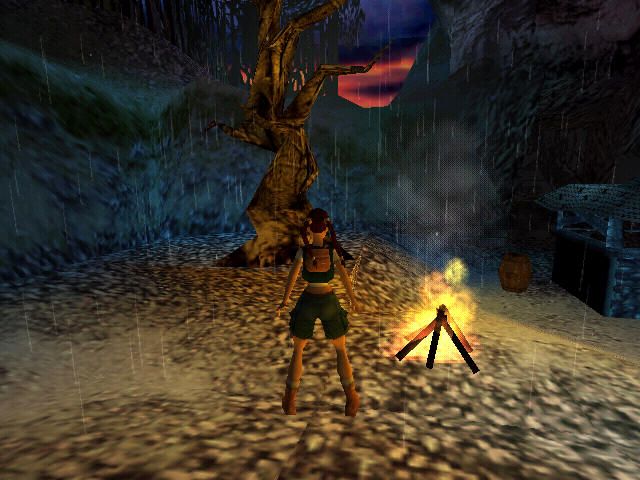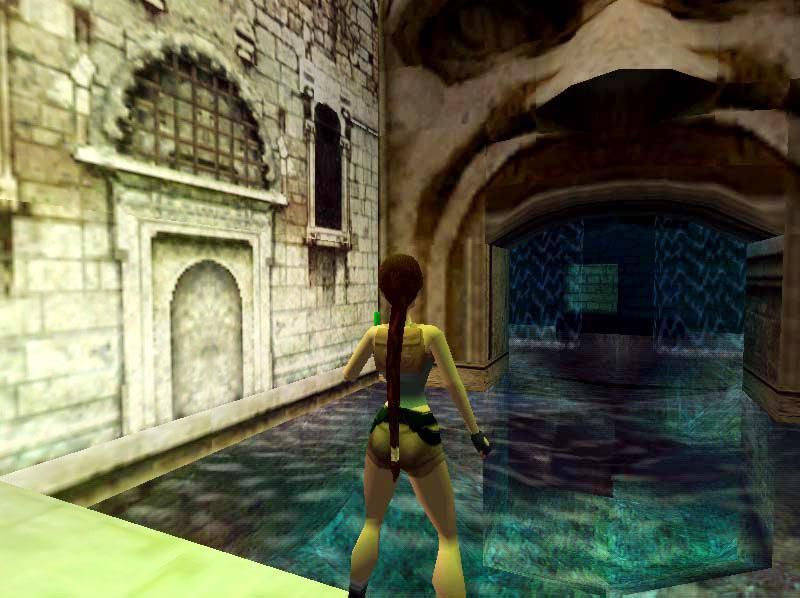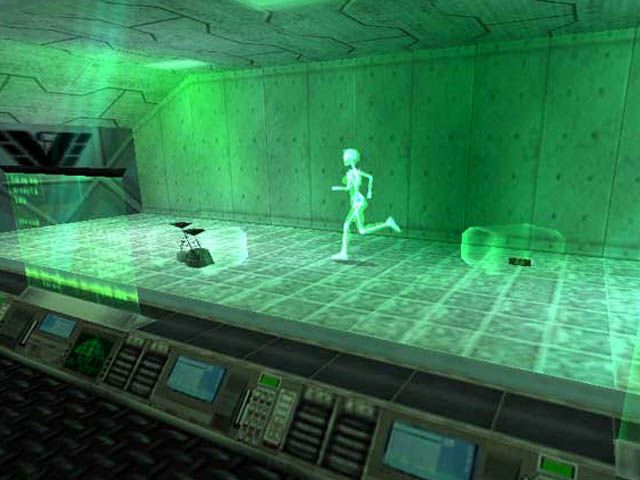Retro Replay Review
Gameplay
Tomb Raider: Chronicles stays true to the series’ signature mix of exploration, puzzle‐solving, and platforming, while introducing a handful of new maneuvers that diversify Lara’s toolkit. Fans of the franchise will feel instantly at home with the familiar control scheme, but the ability to walk along tightropes and swing on horizontal bars opens up more dynamic traversal challenges. These additions make certain puzzles feel refreshingly different, requiring a more deliberate sense of balance and timing.
(HEY YOU!! We hope you enjoy! We try not to run ads. So basically, this is a very expensive hobby running this site. Please consider joining us for updates, forums, and more. Network w/ us to make some cash or friends while retro gaming, and you can win some free retro games for posting. Okay, carry on 👍)
One of the most welcome gameplay enhancements is Lara’s new somersault move, which allows her to launch forward from a crouch at the edge of a platform. This move not only looks graceful on screen but also gives players new strategic options for clearing wide gaps or evading traps. Combined with the grappling hook, which lets Lara latch onto distant ledges and swing across chasms, exploration takes on an almost acrobatic quality that keeps each level engaging.
Beyond Lara’s expanded moveset, Chronicles introduces a level editor that significantly boosts replay value. Players can craft their own tombs, lay traps, and design puzzles for friends to conquer. While the editor’s interface can feel a bit clunky by modern standards, the creative freedom it offers ensures that die-hard fans have a near-endless supply of challenges to test their skills. This community-driven content keeps Tomb Raider: Chronicles relevant long after the main campaign is finished.
Graphics
At the time of its release, Tomb Raider: Chronicles pushed the boundaries of what the PlayStation and PC hardware could achieve. Character models are more detailed than ever, with Lara sporting subtle costume textures and fluid animations that bring her athleticism to life. Environmental design leverages pre-rendered backgrounds alongside real-time polygonal elements, creating richly detailed settings that range from sun-drenched Roman courtyards to the shadowy corridors of a high-tech underground complex.
Lighting effects play a major role in setting the mood for each chapter. In the Ireland flashback, mist rolls in off the Black Isle, casting an ethereal glow over moss-covered ruins, while the Iris artifact levels feature sleek metallic corridors bathed in harsh fluorescent light. These contrasting visuals showcase the development team’s ability to craft distinct atmospheres that match each story segment’s tone.
Though occasional texture pop-in and lower polygon counts are noticeable by today’s standards, Chronicles remains impressive for its era. The draw distance is generous, enabling panoramic views of sprawling tombs and distant landmarks. Occasional frame-rate dips in the more complex outdoor environments are a small price to pay for the sense of scale and immersion that Tomb Raider: Chronicles consistently delivers.
Story
Picking up just days after the events of Tomb Raider: The Last Revelation, Chronicles frames its narrative through the memories of Lara’s closest friends, who believe she has perished. This unique storytelling device allows the game to explore tantalizing “lost” chapters of Lara’s career, spanning diverse time periods and locales. From her childhood encounter with monsters on the Black Isle of Ireland to her daring thwarting of a gang leader in wartime Europe, each vignette adds depth to Lara’s character.
The Rome segment, in which Lara hunts down the elusive Philosopher’s Stone, offers a rich historical backdrop peppered with hidden chambers and cryptic inscriptions. In contrast, the Spear of Destiny mission unfolds in gritty urban ruins, where Lara must outwit a ruthless crime lord determined to unleash supernatural power. These varied set pieces keep the pacing brisk and allow players to experience a range of tones—from gothic horror to globe-trekking adventure.
The final flashback, set within a high-security research facility, introduces sci-fi elements that broaden the franchise’s scope. Here, Lara pursues the Iris artifact, unlocking high-tech puzzles and stealth segments that depart from the series’ usual fare. While the episodic structure can feel slightly disjointed, the overarching theme of friends piecing together Lara’s legacy provides a strong emotional anchor.
Overall Experience
Tomb Raider: Chronicles is a compelling entry that manages to honor the series’ roots while experimenting with new mechanics and narrative structure. The blend of classic exploration, innovative traversal moves, and a user-driven level editor ensures that both newcomers and veterans will find plenty to enjoy. Each flashback chapter introduces fresh thematic elements, preventing the gameplay from ever feeling stale.
Though some technical rough edges—such as occasional camera quirks and texture streaming—remind players of the game’s age, the core experience remains as exhilarating as ever. The sense of discovery when uncovering hidden relics or solving a particularly fiendish puzzle captures the heart of what makes Tomb Raider a beloved franchise. The game’s diversity of locations and atmospheres keeps players engaged for the entirety of its runtime.
For anyone looking to delve deeper into Lara Croft’s storied past or for those craving more tomb-delving action, Tomb Raider: Chronicles delivers a well-crafted adventure. Its balance of nostalgia, innovation, and creative freedom makes it a standout title in the late ’90s 3D action-adventure landscape. Whether you play through the classic campaign or share Tomb Raider’s magic by designing your own levels, Chronicles offers a rich and rewarding journey.
 Retro Replay Retro Replay gaming reviews, news, emulation, geek stuff and more!
Retro Replay Retro Replay gaming reviews, news, emulation, geek stuff and more!









Reviews
There are no reviews yet.